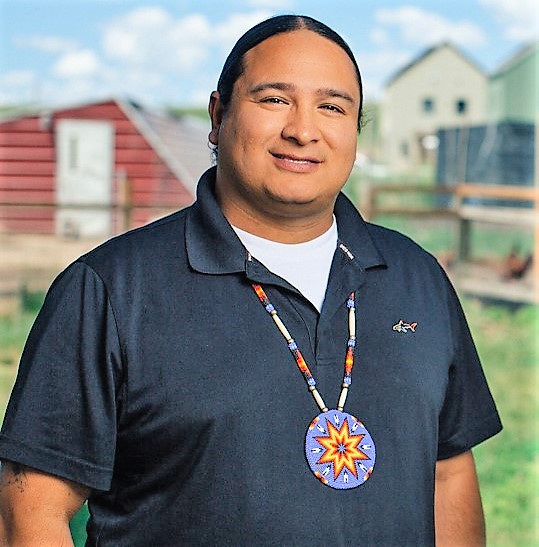Rally for Clean Water on October 4
RAPID CITY – The grassroots statewide non-profit Dakota Rural Action has invited international award-winning native community leader Nick Tilsen to headline its Oct. 4 public Rally for Clean Water, as Lakota Territory residents gear up for hearings on proposed uranium mining in the Black Hills’ aquifers.
The admission-free event, complete with local food and live music, is set for 5:30 to 10 p.m. at Rimrock Camp. It is designed to provide background and information on how to participate in the EPA’s Oct. 5 Hot Springs EPA hearing about potentially giving out groundwater permits for the Dewey Burdock Project to mine and mill uranium in unceded 1868 Ft. Laramie Treaty territory.
Tilsen, the president and CEO of the Rapid City-based international NDN Collective, is fresh from a recent court victory over South Dakota Gov. Kristi Noem’s 2019 Riot Boosting Act. Federal District Judge Lawrence L. Piersol temporarily enjoined its enforcement Sept.18, recognizing its “threat of irreparable harm” to plaintiffs who are self-proclaimed water protectors.
They are Dakota Rural Action, Sierra Club, NDN Collective, Tilsen, Dallas Goldtooth and his organization Indigenous Environmental Network. The American Civil Liberties Union is litigating.
Dakota Rural Action, together with the Black Hills Clean Water Alliance, the Oglala Sioux Tribe, Inter-Mountain West Uranium and Water Summit, and others, are opposing any grant of water permits for the Dewey Burdock Project, because of its impact on cultural and natural resources.
The project would be the first radioactive in situ leach mining in South Dakota. It would be located on 10,000 acres of Custer and Fall River counties adjacent to the Pine Ridge Indian Reservation and upstream at the headwaters of the Cheyenne River.
The in-situ technique leaches uranium from the rock by injecting chemicals into the underground water table to dissolve the deposits. Then, pumps force the minerals in solution through pipes to the surface. There, the radioactive material is refined into yellow cake for shipment to nuclear fuel and weapons manufacturers. The wastewater is disposed either on the surface or back underground.
The EPA’s Denver branch office is in charge of the application for two permits to punch some 4,000 new injection well holes in the aquifers for this process.
The office also is taking public comment on the operator’s request for the agency to exempt it from compliance with the quality standards of the Clean Drinking Water Act in order to proceed.
An exemption would be needed to carry out the project because “the restoration of an in-situ leach-mined aquifer to pre-mining water quality is an impossibility,” the Nuclear Regulatory Commission states.
Granting the exemption and the two permits would clear the way for the South Dakota Water Management Board to conduct hearings on whether to grant the applicant the rights to use 8,500 gallons of water per minute, free-of-charge, indefinitely. The applicant is Canadian Chinese Azarga Uranium Corp., doing business as Powertech USA Inc.
“This project would impact three out of the four major aquifers that can be used for drinking water in the Black Hills,” Clean Water Alliance said in inviting people to “Bring your family and friends” to the hearing to “state your opposition or support others in their statements.”
The hearing is set for 9 a.m. to noon and 2 p.m. to 6 p.m. at the Mueller Center at 801 South 6th St., Clean Water Alliance said carpooling would be available from Rapid City at 7:45 a.m., and lunch would be served in Hot Springs.
In addition, the organization has arranged for vans to provide the public transportation to the hearing. One is set to load at Oglala Lakota He Sapa Campus, 127 Knollwood, Rapid City, at 7 a.m. and depart for Hot Springs at 7:30 a.m.
One is set to load at Thunder Valley Community Development Corp. near Sharps Corner at 7 a.m. and leave there by 7:30 a.m.
Another loads right by Big Bat’s at Pine Ridge at 7:15 a.m. and leaves no later than 7:45 a.m.
The EPA has not yet consulted tribal officials on a government-to-government basis about these permits, as prescribed by federal environmental law, some of the 700 witnesses testified at previous hearings on these same permits.
However, the agency says it is seeking public comment on “the identification of traditional cultural properties … and on measures to avoid, minimize, or mitigate potential adverse effects on historic and traditional cultural properties pursuant to Section 106 of the National Historic Preservation Act.”
On Sept. 18, the agency responded to public requests to extend the period for comments, allowing until Dec. 9 for written submissions. At the same time, it provided a table summarizing the substantive changes it has made on the proposed permits, based on comments at the earlier hearings in 2017.
The table is available at www.epa.gov/uic/proposed-changes-epa-draft-permit-documents-dewey-burdock
Written comments may be submitted at the Hot Springs hearing or submitted online at www.regulations.gov under docket number EPA-R08-OW-2019-0512. Comments also may be sent by mail to Valois Robinson, U.S. EPA Region 8, Mail Code: 8WD-SDU, 1595 Wynkoop St., Denver, CO 80202-1129.
To attend the Oct. 4 Rally for Clean Water at Rimrock, register at forms.gle/snqf5C4BCrsXm43H8 or by calling Dakota Rural Action at (605) 692-5204. Limited overnight accommodations are available on site.
To reserve a van seat or carpool for the Oct. 5 hearing in Hot Springs, contact Andy at 605-455-2700 or Julie at 605-212-5240 or sante076@umn.edu Those with reserved seats will be seated first, with walk-ins welcome as ride space allows, organizers said.
(Contact Talli Nauman at talli.nauman@gmail.com)

